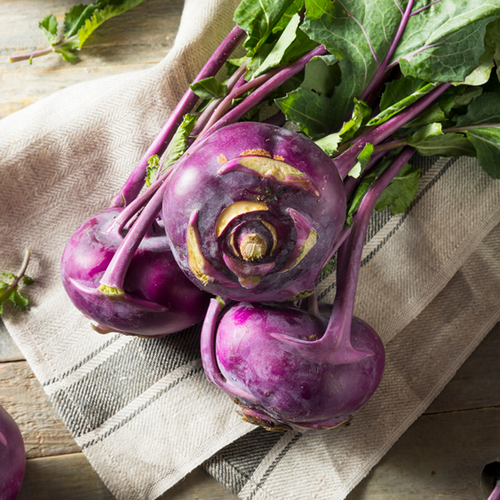
Kohlrabi
Scientific names: Brassica oleracea, Brassica oleracea var. gongylode, Brassica oleracea L. var. caulorapa
Family: Brassicaceae/Cruciferae
Alternate names: Bladkoolachtigen, Cabbage Turnip, Cai Tou, Cavolo Rapa, Chou Navet, Chou Rave, Col Rábano, Coli Rabano, Colinabo, Colirrabano, Couve Nabo, Couve Rábano, Glaskalrabi, Hungarian Turnip, Kaalrabi, Kalarepa, Kålrabbi, Kålrabi, Karalábé, Knolkhol, Knolkool, Knudekål, Knutekal, Kol'rabi, Koolrabi, Kyssakaali, Kyuukei Kanran, Nuikapsas, Pie Lan, Rubkohl, Ryukyu Kanran, Stem Turnip, Turnip Cabbage, Turnip Kale, Turnip-Stemmed Cabbage
Actions: Anticancer properties, Antioxidant
Background
Kohlrabi is a vegetable that is similar to cabbage, broccoli, cauliflower, kale, collard, and Brussels sprout. The stem and leaves of kohlrabi are eaten as food and as a medicine.
Kohlrabi is taken by mouth for cancer prevention, as well as for heart disease, obesity, constipation, and other conditions, but there is no good scientific evidence to support its use.
Kohlrabi is taken by mouth for cancer prevention, as well as for heart disease, obesity, constipation, and other conditions, but there is no good scientific evidence to support its use.
Safety Safety definitions
When taken by mouth: Kohlrabi is LIKELY SAFE when consumed in food amounts. There isn't enough reliable information to know if kohlrabi is safe in medicinal amounts or what the side effects might be.
When applied to the skin: There isn't enough reliable information to know if kohlrabi is safe or what the side effects might be.
When applied to the skin: There isn't enough reliable information to know if kohlrabi is safe or what the side effects might be.
Special Precautions & Warnings:
Pregnancy and breast-feeding: There isn't enough reliable information to know if kohlrabi is safe to use in medicinal amounts when pregnant or breast-feeding. Stay on the safe side and stick to usual food amounts.Effectiveness
NatMed Pro rates effectiveness based on scientific evidence according to the following scale: Effective, Likely Effective, Possibly Effective, Possibly Ineffective, Likely Ineffective, Ineffective, and Insufficient Evidence to Rate.
Insufficient evidence Effectiveness definitions
- Cancer.
- Heart disease.
- A type of inflammatory bowel disease (ulcerative colitis).
- Constipation.
- A type of inflammatory bowel disease (Crohn disease).
- Diabetes.
- Gout.
- Hemorrhoids.
- Symptoms of menopause.
- High cholesterol.
- Liver disease.
- Menstrual symptoms.
- Pain due to pressure on the sciatic nerve (sciatica).
- Scurvy.
- Obesity.
- Wound healing.
- Hair loss.
- Other conditions.
Dosing & administration
The appropriate dose of kohlrabi depends on several factors such as the user's age, health, and several other conditions. At this time there is not enough scientific information to determine an appropriate range of doses for kohlrabi. Keep in mind that natural products are not always necessarily safe and dosages can be important. Be sure to follow relevant directions on product labels and consult your pharmacist or physician or other healthcare professional before using.
Interactions with pharmaceuticals
It is not known if this product interacts with any medicines.
Before taking this product, talk with your health professional if you take any medications.
Before taking this product, talk with your health professional if you take any medications.
Interactions with herbs & supplements
There are no known interactions with herbs and supplements.
Interactions with foods
There are no known interactions with foods.
Action
Kohlrabi contains chemicals that are thought to help prevent cancer. Chemicals in kohlrabi might also have antioxidant activity.
vital.ly has licensed monographs from TRC Healthcare.
This monograph was last reviewed on 31/07/2023 10:00:00 and last updated on 14/11/2020 02:19:43. Monographs are reviewed and/or updated multiple times per month and at least once per year.
Natural Medicines disclaims any responsibility related to medical consequences of using any medical product. Effort is made to ensure that the information contained in this monograph is accurate at the time it was published. Consumers and medical professionals who consult this monograph are cautioned that any medical or product related decision is the sole responsibility of the consumer and/or the health care professional. A legal License Agreement sets limitations on downloading, storing, or printing content from this Database. No reproduction of this monograph or any content from this Database is permitted without written permission from the publisher. It is unlawful to download, store, or distribute content from this site.




